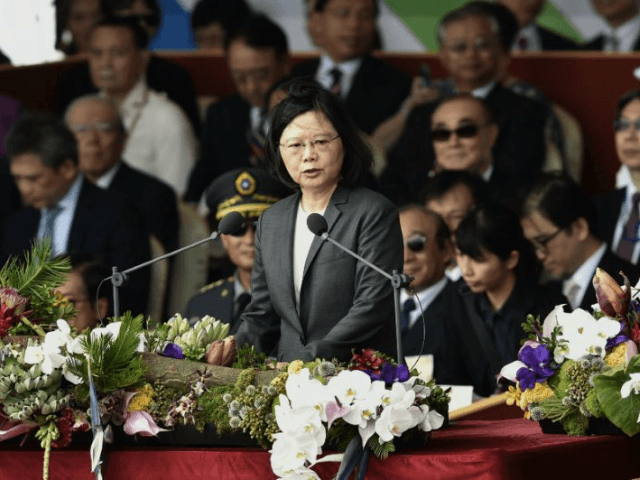The government of Taiwan declared on Wednesday that the people of the island will “absolutely” reserve the right to determine their own future, in the wake of Chinese President Xi Jinping’s call for the island to be returned to Beijing’s control, in a manner that implied military force was not out of the question for accomplishing that objective.
“We have the resolve, the confidence, and the ability to defeat separatist attempts for Taiwan independence in any form,” Xi asserted in his speech to the Communist Party Congress on Wednesday, drawing a sustained round of applause from his audience.
The Foreign Policy Research Institute noticed Xi playing a bit of “hardball” with one passage of his speech, which listed some benefits his “Taiwan compatriots” might enjoy in the future through improved relations with Beijing, including “the same treatment as local people when they pursue their studies, start businesses, seek jobs, or live on the mainland.” As the FPRI points out, these are all things the Taiwanese can already do, so Xi’s remarks could be interpreted as a cleverly-worded warning that those privileges might evaporate if Taiwan’s current administration doesn’t start toeing the line.
“The Republic of China is a sovereign state and we will protect our sovereignty,” Chiu Chiu-cheng, deputy head of Taiwan’s Mainland Affairs Council, responded on Thursday.
“If China wants to have peace and a stable relationship, we need to sit down and talk. China needs to understand Taiwan is a sovereign state and we need to figure out how to cooperate under this condition,” Chiu added, alluding to China’s suspension of normal diplomatic relations with Taiwan in June 2016.
That suspension occurred because Taiwan’s President Tsai Ing-wen “did not recognize the 1992 Consensus, the political basis for the One China principle,” as a spokesman for Beijing’s Taiwan Affairs Office put it. The 1992 agreement established that Taiwan and China are part of the same nation, literally reducing the relationship between Taipei and Beijing to an argument over what the term “China” means.
Over the summer of 2017, China waged an aggressive diplomatic campaign against Taiwan, persuading Taiwan’s ally Panama to switch diplomatic allegiance to Beijing, while Dubai, Jordan, Ecuador, and Bahrain all stopped using the term “Republic of China” to refer to Taiwan.
To top that off, the World Health Organization revoked Taiwan’s observer status at its annual summit, and staffers at the U.N. Human Rights office in Geneva began curtly informing visiting Taiwanese students and professors that “Taiwan is not a country” when they tried to visit the public gallery.
Taiwan accused the United Nations of allowing itself to be used as a tool of Beijing over that last indignity. “The UN claims to respect freedom for all, regardless of race, nationality, political or other identities … to serve the political purpose of a particular member nation goes against its mission,” said the Taiwanese Foreign Ministry in a statement.
One Taiwanese professor said that when she asked for help from Director-General Michael Moller of the U.N. office in Geneva, he refused on the grounds that “Taiwan isn’t following the One China policy.”
“Am I speaking to a spokesman for China?” the stunned professor wondered.
China’s pressure campaign against Taiwan reached the United States as well, with demands that Congress refrain from passing legislation that would strengthen Washington’s relationship with Taipei. The Chinese Embassy threatened “severe consequences” for U.S.-China relations if certain bills favorable to Taiwan were passed. China’s boldness in threatening the U.S. Congress the way it pushes the governments of smaller countries around was noted.
In a speech commemorating Taiwan’s National Day on October 10, Tsai insisted her position on relations with the mainland has not changed.
“We will continue to safeguard Taiwan’s freedom, democracy, and way of life, as well as ensure the Taiwanese people’s right to decide our own future,” she declared. “Our goodwill will not change, our commitments will not change, we will not revert to the old path of confrontation, and we will not bow to pressure.”
The Foreign Policy Research Institute hypothesizes that Xi’s speech didn’t really foreshadow a major change in China’s policies toward Taiwan. Instead, he was using slightly more forceful verbiage to conduct the kind of “chest thumping” and “minor saber rattling” China has shown Taiwan for decades. Beijing has always drawn a red line at Taiwan declaring formal independence and treated fealty to the 1992 consensus as a way for Taiwanese leaders to indicate they have no intention of doing so.
Conversely, the Diplomat sees the insistence of President Tsai’s Democratic Progressive Party on referring to “1992 talks” instead of a “1992 consensus” as a coy means of annoying Beijing and keeping at least the theoretical possibility of independence alive. Somewhat less coy was the Taiwanese Mainland Affairs Council responding to President Xi’s speech by urging Beijing to stop “one-sidedly pushing for ‘one country, two systems’ policy and the One China principle.”

COMMENTS
Please let us know if you're having issues with commenting.